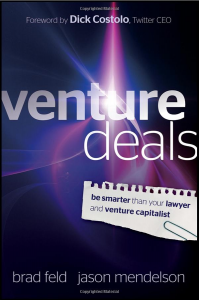 At more than one point in Venture Deals by Brad Feld and James Mendelson, did my eyes glaze over and require me to go back and read again. This, in spite of how frequently the authors state that this book is mostly for entrepreneurs seeking their first financing. That leads me to believe that seeking financing is either brain surgery–and that’s a real possibility–but I tend to think the topics in the book could have been delivered more effectively.
At more than one point in Venture Deals by Brad Feld and James Mendelson, did my eyes glaze over and require me to go back and read again. This, in spite of how frequently the authors state that this book is mostly for entrepreneurs seeking their first financing. That leads me to believe that seeking financing is either brain surgery–and that’s a real possibility–but I tend to think the topics in the book could have been delivered more effectively.
The authors are both successful entrepreneurs and founders of the venture capital firm The Foundry Group. Jason Mendelson was at once an attorney–which makes better sense of why they take so many pot-shots at lawyers. Brad Feld seems to be a serial venturpreneur, a thing I just now made up. He’s started a bunch of venture capital firms. There’s good reason to take these guy’s words into consideration.
“The Terms Sheet” in a business negotiation, like obtaining a financing, is kind of like an engagement ring. It outlines the desires and intentions of a deal. Then, it’s taken by both party’s lawyers and scratched away at until it’s a legally binding agreement and something is transferred, like money or a bunch of pigs and sheep. The terms sheet is a legal looking document, but isn’t exactly yet. But it is important.
A very healthy portion of the book focuses on the topic of the terms sheet, breaking it apart bit by bit. The authors suggest that the importance of the terms sheet mystifies the relative flexibility of it, and that many first-time entrepreneurs blow-it by stressing too hard over issues in the terms sheet that matter very little in the broad scheme of the financing.
The book also dedicates pages to the different rolls involved in a venture capital deal, which helps us conceptualize the the interplay of communication and cooperation needed for the task. The authors also cover the structural basics of a typical venture capital fund, as well as a bunch of the negotiating tactics venture capitalists will often use to lopside a deal, and tips for negotiating responsively to keep the scales in balance.
Throughout all of it, the authors are trying to clarify which points are really going to matter to an entrepreneur, and encouraging them to be flexible with the points that don’t matter so much.
The book is formatted a bit frustratingly. Some chapters are only a couple pages long, and others are twenty or thirty pages long, when it just seems a little unnecessary. The book often refers to “The Entrepreneurs Perspective”, which I found mostly distracting.
Venture Deals almost reads kind of like a legal document itself, at times attempting to bee too clear itself. The topics are complex, and although “The Entrepreneurs Perspective” was a good effort, I think this topic would have been really well served with some consistent case studies or fictional financings. I often found myself needing to reference things from earlier in the book because I had forgotten how they worked together. Had the authors invented a “Jane Super-Cool Tech, LLC” and used it throughout the book, I think the core concepts would have come through more clearly.
In Conclusion
Meaty book, but a tad dry and challenging to read. Also formatted in a way that could be a bit frustrating to use as a reference during a financing attempt. Still, likely worth combing through if you are going for some real life financing, in which case this book will probably just be a walk in the park.

Recent Discussion